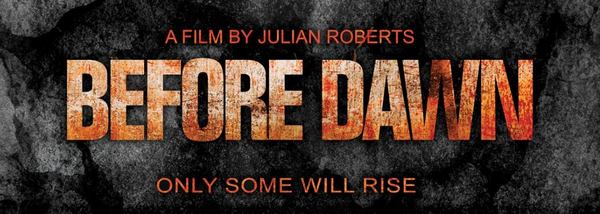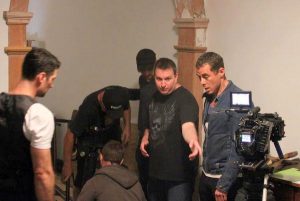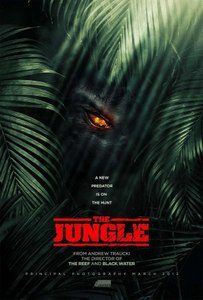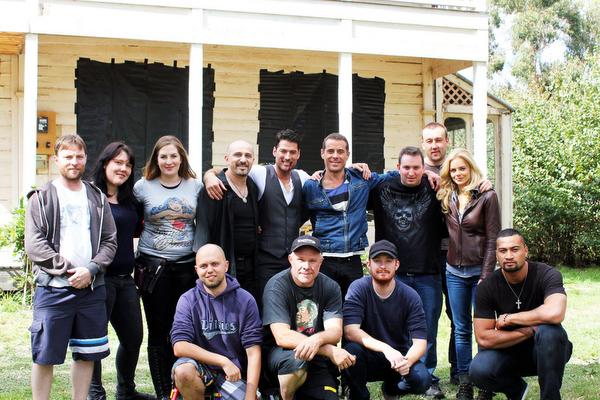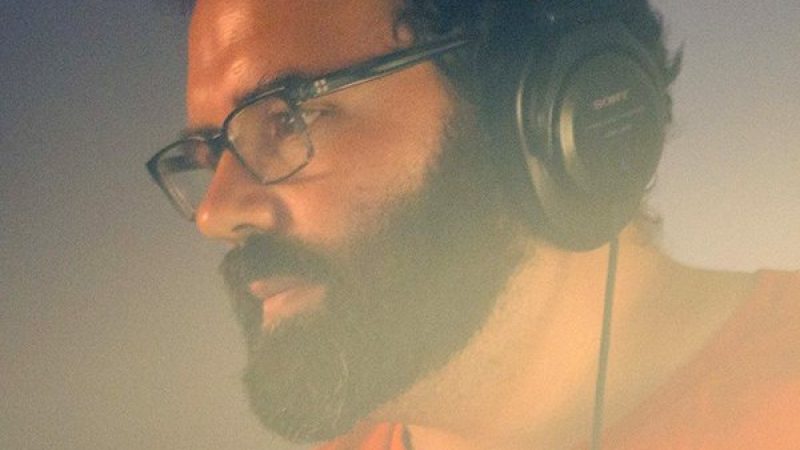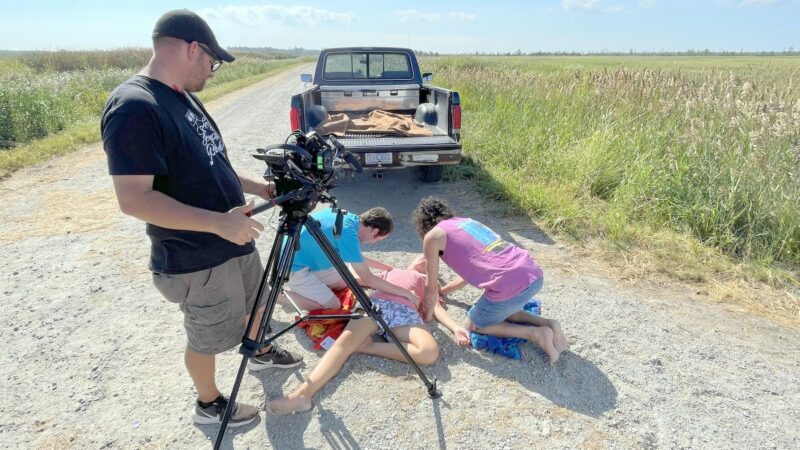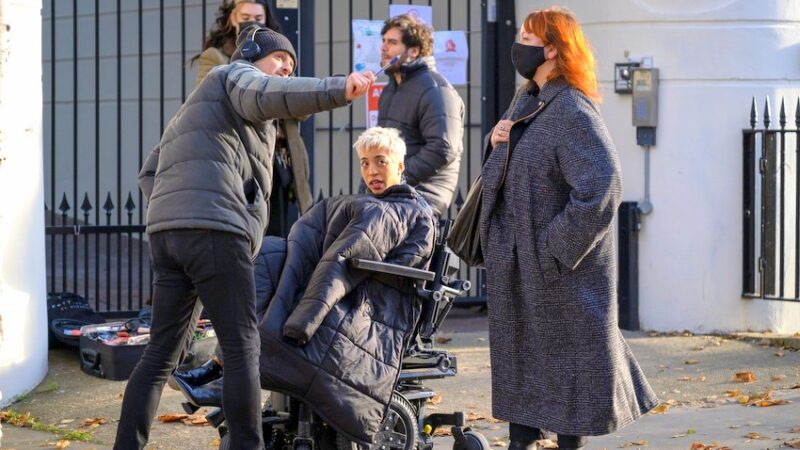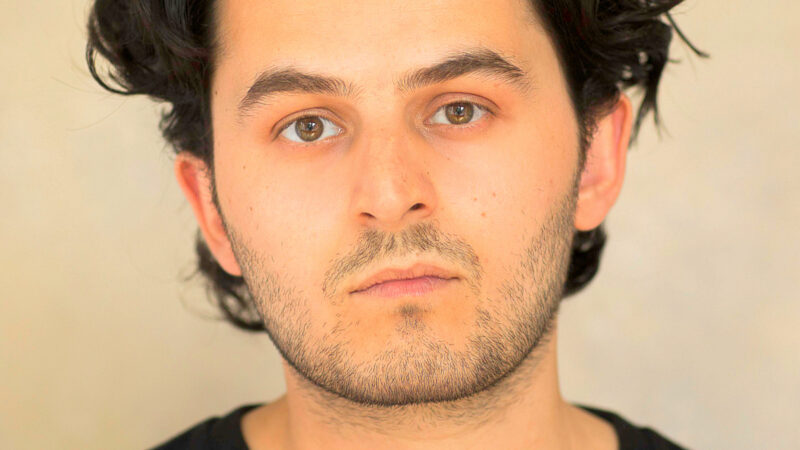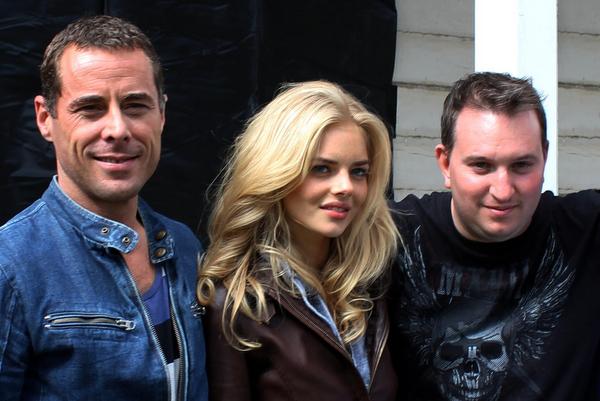
I was born and raised in Melbourne, Australia. I attended film school at Footscray City College and then the Institute of Lens Arts Australia (a private course run by a former professional Cinematographer). While at film school I made a number of shorts, then moved into writing features quite early. Prior to the digital revolution, I had a lot of encouragement too from production companies, but in short was told to come back when I was older, which was disheartening.
In front of the Clock tower from Back to the Future pic.twitter.com/8zPoQDMx4D
— Julian Roberts (@julianroberts_) October 4, 2013
I fell away from the industry for a while and worked in hospitality, but it was always in the back of my mind to make films. After running into a friend from film school who was making his first feature, this inspired me to give it another shot. I went into writing mode again where I created a few screenplays, one titled ‘Before Dawn’, which I am currently preparing to shoot in 2017 with Marcus Graham, Samara Weaving and William Emmons.
How would you describe your work as a director
I am a visual director, and like to move the camera to enhance the emotional context of the story. I also work closely with the actors to try and get the best possible performance by providing a good environment for creativity, where the actors can feel open to trying new things outside the script and in the moment. I enjoy the rehearsal process where I can begin to see what works and what doesn’t and organically grow the actor’s performance. I give 100% when I am on set and this means being prepared offset to make sure everyone gets the most out of each day shooting.
How did you get into directing
Ever since I was a kid I loved going to the movies, but it was when I first watched ‘Raiders of the Lost Ark’ that I knew, this is what I wanted to do with my life. I want to tell stories that transport the viewers to another place, time, create laughter, provoke tears and feel for the protagonist’s journey as if it were their own.
How do you choose a project to direct
The project has to speak to me on an emotional level and be a story that I want to tell, it needs to talk about the society we live in and how we treat each other as human beings. It doesn’t work to make creative decisions based on profit, I have to trust and make decisions in my work that I am proud of.
When you spend years of your life on a single project, you can’t afford regrets nor underestimate the incredible amount of work hours you need to do, to get results you are proud of… So feeling passionate about the story you are telling is key for me.
Do you take courses to increase you craft
I am always taking classes from screenwriting courses/books such as John Truby, John August, Syd Field to name a few and I am currently reading a great book on storytelling a called ‘Into the Woods’ by John Yorke. I recently did a two-day directing workshop under Daina Reid (one of the top Australian TV Directors on working with actors for film and TV) and completed the Dustin Hoffman online acting school in 2015 and plan to do the Kevin Spacey course as well, which helps me to relate to actors and get the best out of them.
I also recently met with 9 time Emmy Award Winning Director Thomas Schlamme (West Wing, Manhattan) who gave me advice about my film and the industry and he really liked the investor pitch trailer for ‘Before Dawn’.
Why will you choose an actor, writer or producer. What do you look for
Choosing an actor comes down to who is right for the part. The casting and audition process are imperative, and having a good casting agent is key. Like the casting process, it takes time to find the right producer who you can work with. You need to have a similar vision for the project from the start, and the producer needs to be driven in making the project succeed. There can be many setbacks along the way so a producer with drive, that has your back, keeps you in line and calls the shots when it’s required is how outcomes are achieved in good filmmaking.
Writing is a passion for me, so when it comes to working with another writer I like to address where their weaknesses are. When you a find a writer whose strengths are your weaknesses, you are winning. If you are good at structure but not great at dialogue, bring in another writer who is great at dialogue and understands the story and characters you are trying to create. There definitely needs to be a symbiotic rapport between myself and the other writer, and we need to have the same vision for the story.
In the end, the film industry is a business. Investors need to make their money back which can sometimes heavily influence the process, as they want to see “names” to ensure the project is a financially viable investment. Despite this, you have to try and find a happy medium between getting the right actor, producer or writer, and what will make the investors happy or nobody is going to fund your film.
When you are offered a project, what things do you put in place to deliver a good job
It all comes down to the script. If it is a project that I want to spend a couple of years working on then having a good team is how it comes to life. I aim to work with the absolute best people I can find for each role. As the saying goes, you are only as strong as your weakest link. Once I have surrounded myself with the key cast/crew and then you can begin talking to investors/distributors, production companies.
Briefly explain your latest work
My latest film is ‘Before Dawn’ which stars Marcus Graham, Samara Weaving, William Emmons, Nick Britton, Nikki Osborne, Albert Goikhman, Anthony Assante and Tasker Streete. The film tells the story of a grieving father who must protect his daughter and brother from a horde of infected people, while working together with a group of criminals who have taken them hostage in a small country town. APA call it ‘Straw Dogs meets Night of the living Dead’ and it is in the same vein as 28 Days later, The Walking Dead and the French film La Horde.
What thing/situation helps you during production
Communication is key. If you are unable to communicate what you want the whole process slows down. Cast and crew can lose confidence if you don’t know what you want and are unable to articulate how you see the scene playing out. Of course things can change, but you need to have a game plan of how you would like the scene to work, from where you place the camera to what the actors are doing. Having a great producer and 1st AD are incredibly important to help organize and schedule your shoot and deal with problems that occur behind the scenes, so that you can focus on directing the film.
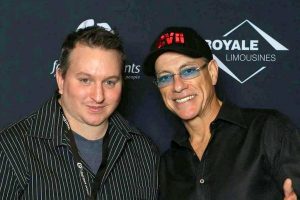 How do you advise directors to find projects
How do you advise directors to find projects
At the start of your career you need to create your own work to get noticed. Whether it is shorts, music videos, commercials or web series, building up your show reel is a great stepping-stone prior to making a feature. Write your own scripts and work with other writers, but continue to produce your own material that you can leverage to work on bigger projects. Always push yourself to learn and improve and with each project aim to get a larger budget.
How can filmmakers finance projects
On the smaller, low budget end you can self-finance or crowd fund. However, if you want to take your career seriously you should try and align yourself with an established producer who believes in your project. Although I believe all directors should learn how to produce to appreciate what work goes into projects to make it happen, and to have more creative control over your work. Try and get your script to name actors who are happy to let you use their name to try and drum up financing for the film. Have a proper budget done from a line Producer and Business Plan & Information Memorandum. Always consult with a Lawyer before even attempting to speak to Investors, as every country is different and there are laws in place to how you can approach investors. If you don’t learn these laws your project can be dead in the water before it even gets off the ground.
What do you want from an actor in production
The aim is to work together to achieve the vision of the script. However, the script is a blueprint, which can change at anytime in the process. I like to let the actors improvise and see what they come up with while they are in character, as long as it doesn’t change the outcome of the scene or the structure of the plot, some of the best work comes from the actor while on set that hasn’t been rehearsed and can breath life into the character that wasn’t there before.
How do you prefer to work with a producer during a production
I work very closely with the producer throughout the film and like to rely on the producer to take care of any problems behind the scenes so that I can focus on directing the film.
What do you think a director can do to get into the film industry
There is no set path to become a director. There are multiple ways you can make short films and win a big festival that launches your career. You can start as a 3rd AD and work your way up from there to directing. Or, you can write, produce and direct your own film, which is the path I have chosen.
Who is your favorite director
Now that’s a hard one. I have many including Martin Scorsese, Steven Spielberg, Michael Mann, Oliver Stone, QT, Stanley Kubrick, Orson Welles, Clint Eastwood, Christopher Nolan, Ridley Scott, David Fincher, Terrence Malik, Paul Thomas Anderson, Steven Soderbergh, Sidney Lumet, Robert Altman, Akira Kurosawa, Ridley Scott, Tony Scott, Phillip Noyce, James Cameron, Robert Zemeckis, Katherine Bigelow, Sam Peckinpah, Sergio Leone, Sam Raimi, Peter Jackson, Brian De Palma, The Coens, Mike Nichols, Elia Kazan, John Huston, Frank Capra, Roman Polanski, Peter Berg, Ben Affleck, Zack Snyder, Alfonso Cuaron, Denis Villeneuve.. I am sure there are a few I have left of the list.
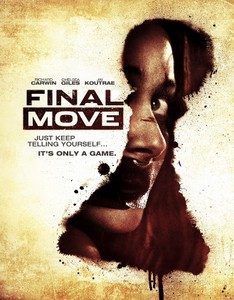 Why
Why
From my list of favorites, I would have to say Scorsese is just incredible. I love the way he moves the camera and the performances he gets from his cast. His ability to tell a story is unmatched from his work in Mean Streets, Alice Doesn’t live here Anymore, Goodfellas, Taxi Driver, Casino, Raging Bull, Kundun, The Color of Money, The Aviator, Shutter Island, The Departed, Wolf of Wall Street and the list goes on.
His impact and influence on the world of cinema is undeniable as arguably the greatest filmmaker of all time. He touches on the American psyche like few directors can, and has given us a visual history of America from the sixties to present day.
What advice would you give to directors around the world
Build your own voice, learn to produce so you can have more control over your work, continually push yourself to improve and learn new things. Build a network of people you can work with from project to project. Don’t screw people over and feed your cast and crew well.
Marcus Graham, Samara Weaving and myself on the set of Before Dawn pic.twitter.com/dnhpQJT0Dt
— Julian Roberts (@julianroberts_) October 4, 2013
Briefly write about your career
I began my career at film school where I made a number of shorts, I was an assistant grip (uncredited) on the film Darkness Falls directed by Jonathan Liebesman. I helped fund two Aussie Indie features in 2013 Final Move (Executive Producer) & The Jungle (Associate Producer).
I have been back and forth this year between LA and Australia building contacts/relationships with Studios, Agents, Managers for multiple projects I have in the works including ‘Before Dawn’, ‘The Summoning’, ‘I Am Vengeance’ and a big budget action film tentatively titled ‘Mexico’.
We plan to go into production on ‘Before Dawn’ in 2017, which we have nearly secured financing on and plan to release in 2018.

